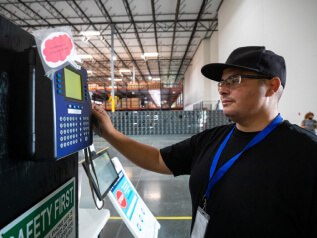
What is Earned Wage Access?
Earned Wage Access “allows employees to safely draw some or all of their earned wages before payday” according to the Financial Health Network. This is also known as EWA or on-demand pay.
Payactiv invented Earned Wage Access in 2012 and our platform makes it possible for employers to offer their employees access to their earned but unpaid wages between paychecks by integrating with the HR systems they already use and making the employees’ wages available from a mobile app. Employees can access their earned wages when they need them and transfer them to their card or bank account to make payments, pick up as cash from Walmart, or use directly for Uber, Amazon, or to pay bills from the app.
EWA platforms aim to provide a meaningful solution to payday loans and overdrafts, while ultimately aiding in the reduction of employee financial stress to boost engagement, productivity, and retention.
US workers made around 56 million EWA transactions amounting to $9.5 billion in 2020
What Are the Benefits of Earned Wage Access?
60%
of employers recognize that offering programs such as EWA can be a low-cost solution to attract and retain employees, as well as generate goodwill among their workforces.
Source: KPMG Advisory, 2021
56%
of employees who had access to their earned wages indicated that they used the benefit.
Source: Finhealthnetwork.org, 2019
In theory, EWA products can have similar use cases as short-term liquidity products, such as small-dollar credit, helping individuals overcome problems with misaligned cash flow and providing a way to cover an emergency expense. However, despite the increasing popularity of EWA products, there is not yet enough evidence to determine their impact on employees’ financial health. (https://finhealthnetwork.org/research/know-your-borrower-the-four-need-cases-of-small-dollar-credit-consumers/) Financial Health Network research has found that most EWA product users access the product consecutively over varying periods of time, and that the employee’s cost to use the product can vary based on the company’s fee model and individual usage patterns. (https://finhealthnetwork.org/research/earned-wage-access-and-direct-to-consumer-advance-usage-trends/)
Employers offering EWA should make sure that their employees understand the service and continue to modify it based on its impact on their employees’ financial wellness. In addition to EWA, businesses should also offer a suite of financial resources to help employees’ financial literacy and health. Lastly, it is important for businesses to minimize any employee fees related to EWA.
In a survey study by Visa in 2019, it reports that 95% of workers would be interested in working at companies that provide EWA (Visa, 2019).
With 7 in 10 workers who quit a job in the last year claiming access to earned wages would make them more likely to stay, it’s clear Earned Wage Access has become a key element in employee benefits packages everywhere. (https://www.payactiv.com/resources/5-myths-around-earned-wage-benefits-and-the-real-facts/)
How Do Earned Wage Access Products Work?

Funding Access to Wages
Employees’ access to wages are usually funded through the EWA vendor – typically through capital on their balance sheet or use of a debt facility. Vendors use a payroll integration (if they do not already manage payroll) or secure timesheet data to verify the earnings that can be accessed through a user-facing application.

Disbursement
Employees can receive access to their wages in one of several ways: funds are sent to an employees’ linked direct deposit account through their employer, to a bank account the employee has set up with the EWA vendor, or to a prepaid or payroll card. Most EWA companies allow users to access 50%-100% of earned wages at a given time. Rules around accesses per pay period or per month and ability to take consecutive accesses vary by provider and by employer.

Payment to EWA Vendor
Wages accessed prior to payday are typically recouped from the users’ very next paycheck, usually meaning a repayment period of less than two weeks. EWA providers have at least a 97% recoupment rate; for those who may have difficulty repaying, some offer referrals to local resources to provide support.

Timing of Payments
Accesses are sent to an employee’s external bank account via direct deposit typically the next business day. Transfers to externally linked debit or prepaid cards can take up to 48 hours. Transfers can be made instant for a $1-$5 fee, depending on the vendor. Conversely, transfers can be instant and often are free for bank accounts or cards offered by EWA vendors.
Source: https://finhealthnetwork.org/research/workplace-financial-health-innovation-rolling-out-an-earned-wage-access-program-for-your-employees/#:~:text=Funding%20Access%20to%20Wages,use%20of%20a%20debt%20facility
Earned Wage Access: The Key Players
| Payactiv | DailyPay | Branch | Even | |
| EWA Pricing | Free with DD on PA card $1/day, +$1.99 instant *Fees capped at $3 for 1 week or $5 for 2 weeks |
$1.99 / 2-3 days Transfer, $2.99 For Instant Transfer | Free with 3 days standard delivery $2.99 for EWAs under $25 $3.99-$4.99 for EWAs $26-$75 |
$8/mo membership fee, can be subsidized by employer |
| Access limit | Customizable by employer, up to 90% net income | up to 100% | up to 50% | up to 50% |
| Bank transfer | Yes | Yes | Yes | Yes |
| Amazon | Yes | No | No | No |
| Uber | Yes | No | No | No |
| Walmart cash | Yes, $1.99/ txn | No | No | Yes |
| Auto-pay | Yes | No | No | No |
| Card | Prepaid, Payroll | No | Debit | No |
| P2P payments | Yes | No | Yes | No |
| Bill pay | Yes | No | Yes | Yes |
| Savings Tools | Goal-based Savings and SmartSave | Yes | No | Yes |
| Budgeting | SmartSpend | No | Yes | Yes |
| Financial counseling | Free 1:1 coaching | No | No | No |
| Discount Marketplace | Rx, car insurance, gas, entertainment | No | No | No |
| Employee Rewards | Yes | Yes | No | |
| In-app communications tool | Yes, customizable for announcements, chats, etc | No | Activity feed, Branch Messenger | No |
| Shifts | Coordination, incentives | No | Yes | No |
Earned Wage Access: The Key Players
This list is not exhaustive but it highlights the four pillars of our EWA program.
- No debits. Payactiv does not use ACH debits that trigger overdrafts.
The CFPB has specifically said that providers who use debits do not comply with the CFPB’s advisory opinion. - Most Compliant in the Industry. Payactiv’s model is compliant in all 50 states and Payactiv indemnifies its clients.
- Payroll-based. Payactiv’s deduction amount is accurately and clearly disclosed on employee paychecks so that workers and payroll departments have full transparency.
- Safe & Responsible. Payactiv protects employees by providing safe and responsible access to net wages so that users do not end up with zero net pay on payday. This protects against payment of larger recurring expenses like rent, utilities, car payments, + +
Third-Party Articles
Here are great third-party articles about the EWA marketplace from trusted sources. Don’t worry – we picked the best articles, not the best articles about Payactiv. You already know we’re great.
- Is Earned Wage Access the Way of The Future? 5 Tips for Employers Seeking to Attract and Retain Talent Through On-Demand Pay March 31, 2022
- Why on-demand pay is the employee retention benefit you need in 2022 March 28, 2022
- Earned Wage Access Catches on in Asia March 28, 2022
- Hourly workers demand more from employers March 2, 2022
- Instant pay and pay-on-demand give HR managers a recruiting edge February 14, 2022
- Is On-Demand Pay Right For Your Company? December 7, 2021
- How Retailers Benefit From Providing Early Wage Access October 5, 2021
- New Study: Earned Wage Access Puts Consumers in Control of Finances, and Life October 4, 2021
- On-demand pay is a decisive pull factor for employees — study September 6, 2021
- Most Workers Want To Be Paid Automatically Every Day According To New Poll September 13, 2021
- New Research From Aite-Novarica Group: On-Demand Pay Eliminates Payday Loans, Overdraft Fees For Millions Of American Workers August 11, 2021
- CFPB Releases Cash Advance Hounds. It’s Time for companies to intensify with their employees July 21, 2021
- Payday disrupted: New platforms help stretched employees tap their earnings in real time July 7, 2021
- In-demand gig workers deserve on-demand payments June 28, 2021
- On Demand Pay Ecosystem Market set to witness huge growth by 2026 with Top Key players like Coinbase, Butterfly labs, Mt.Gox, Avalon, BitcoinX, Bitcoin July 10, 2021
- Earned Wage Access Tackles Labor Challenges Associated with Employee Turnover and Faster Hiring June 2, 2021
- How Earned Wage Access Can Upend Predatory Lending And Build Employee Financial Wellness February 5, 2021
Get Payactiv for your business
Related Articles
Key takeaways: Automated cashless tips provide a secure and efficient way to...
The heart of every business is its employees, and these employees need to be...
February is Black History Month, a time to honor the rich history, vibrant...
© 2025 Payactiv, Inc. All Rights Reserved
24 hour support: 1 (877) 937-6966 | [email protected]
* The Payactiv Visa Prepaid Card and the Payactiv Visa Payroll Card are issued by Central Bank of Kansas City, Member FDIC, pursuant to a license from Visa U.S.A. Inc. Certain fees, terms, and conditions are associated with the approval, maintenance, and use of the Card. You should consult your Cardholder Agreement and the Fee Schedule at payactiv.com/card411. If you have questions regarding the Card or such fees, terms, and conditions, you can contact us toll-free at 1-877-747-5862, 24 hours a day, 7 days a week.
** Central Bank of Kansas City does not administer, nor is liable for earned wage access.
Payactiv holds earned wage access services (EWA) license number 2591928EWA with the Wisconsin Department of Financial Institutions.
Apple and the Apple logo are trademarks of Apple Inc., registered in the U.S. and other countries. App Store is a service mark of Apple Inc., registered in the U.S. and other countries.
Google Play and the Google Play logo are trademarks of Google LLC.
Galaxy Store and the Galaxy Store logo are registered trademarks of Samsung Electronics Co., Ltd.




